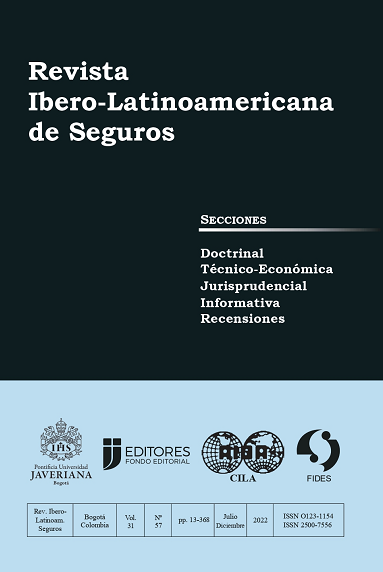Abstract
The Total and Permanent Disability coverage (TPD) includes within the configuration of the claim several elements that together force the insurance company to indemnify. Based on the Costa Rican legislation, the configuration of the claim is analyzed for accident and disability insurance, its delimitation of coverage, period of occurrence, the limitation of pre-existences and factors such as disputability, all expressly regulated in the Insurance Contract Regulatory Law (Law 8956), to then confirm that there are some differences in the general conditions with respect to what we consider the ideal approximation with respect to the interpretation of the law. The theory of “adequate causality" is also addressed in order to confirm that the elements: i.) event (accident or disease) that cause injury with some degree of disability and ii.) the declaration of TPD must take place within a certain window of time for the configuration of the claim.
DOCTRINA:
Domingo M. López Saavedra, LA COBERTURA DE TODO RIESGO Y EL EXAMEN DE LA CAUSALIDAD EN LOS SINIESTROS, in Derecho de seguros (Nicolás Hector Barbato & Juan Carlos F. Morandi eds., 2001).
Federico Torrealba, RESPONSABILIDAD CIVIL (2011).
Isaac Halperin & Nicolás H. Barbato, Derecho de Seguros (3 ed. 2003).
Jorge Alberto Vásquez González, Los modos verbales del español actual, 63 Scielo 255–271 (2013).
Jorge Mosset, La Relación de la Causalidad en la Responsabilidad Civil Extracontractual”., 1 Revista Iberoamericana de Derecho, Universidad Nacional Autónoma de México 357–380 (2004).
Manuel Broseta Pont, Manual de derecho mercantil (6 ed. 1986).
Octavio Guillermo de Jesús Sánchez Flores, La institución del seguro en México (2000).
LEGISLACIÓN:
Chile, Ley 20667 que reforma el Código de Comercio, del 09 mayor del 2013.
Costa Rica. “Ley Reguladora del Contrato de Seguro”. Ley 8956, del 17 de junio de 2011.
España, Ley 50/1980 del 08 de octubre de 1980.
México, Ley sobre el contrato de seguro, última reforma DOF 04-04-2013, del 31 de agosto de 1935.
Perú, Ley Nº 29946, del 27 de noviembre del 2012.
Uruguay, Ley N°19678, del 08 de noviembre del 2018.
JURISPRUDENCIA:
Costa Rica, Sala Primera de la Corte Suprema de Justicia, Resolución número 252-F-2001, del 28 de marzo del 2001.
Costa Rica, Sala Primera de la Corte Suprema de Justicia, Resolución número 00457 – 2013, del 10 de abril del 2013.
This journal is registered under a Creative Commons Attribution 4.0 International Public License. Thus, this work may be reproduced, distributed, and publicly shared in digital format, as long as the names of the authors and Pontificia Universidad Javeriana are acknowledged. Others are allowed to quote, adapt, transform, auto-archive, republish, and create based on this material, for any purpose (even commercial ones), provided the authorship is duly acknowledged, a link to the original work is provided, and it is specified if changes have been made. Pontificia Universidad Javeriana does not hold the rights of published works and the authors are solely responsible for the contents of their works; they keep the moral, intellectual, privacy, and publicity rights.
Approving the intervention of the work (review, copy-editing, translation, layout) and the following outreach, are granted through an use license and not through an assignment of rights. This means the journal and Pontificia Universidad Javeriana cannot be held responsible for any ethical malpractice by the authors. As a consequence of the protection granted by the use license, the journal is not required to publish recantations or modify information already published, unless the errata stems from the editorial management process. Publishing contents in this journal does not generate royalties for contributors.


